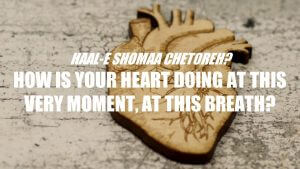
In English when we meet we ask “how are you ?”
As Omid Safi writes in “The Disease of Being Busy“* :
In many Muslim cultures, when you want to ask them how they’re doing, you ask: in Arabic, Kayf haal-ik? or, in Persian, Haal-e shomaa chetoreh? How is your haal?
What is this haal that you inquire about? It is the transient state of one’s heart. In reality, we ask, “How is your heart doing at this very moment, at this breath?” When I ask, “How are you?” that is really what I want to know.
In Leadership, there are few things more powerful than giving people your full attention and truly seeing them. It can be as simple and fleeting as giving a flight attendant eye contact as you say goodbye as you disembark, or addressing a barista by the name on their name tag as you thank them for your morning coffee.
As a coach, sounding board, facilitator, I believe in and practice “Deep Listening” truly being absolutely present at all levels for others.
I, therefore, adore this term “haal” and Omid’s expression of it as a greeting of real care.
Omid writes beautifully, and continues :
I am not asking how many items are on your to-do list, nor asking how many items are in your inbox. I want to know how your heart is doing, at this very moment. Tell me. Tell me your heart is joyous, tell me your heart is aching, tell me your heart is sad, tell me your heart craves human touch. Examine your own heart, explore your soul, and then tell me something about your heart and your soul.
Tell me you remember you are still a human being, not just a human doing. Tell me you’re more than just a machine, checking off items from your to-do list. Have that conversation, that glance, that touch. Be a healing conversation, one filled with grace and presence.
Put your hand on my arm, look me in the eye, and connect with me for one second. Tell me something about your heart, and awaken my heart. Help me remember that I too am a full and complete human being, a human being who also craves human touch.
Beautiful.
My own articles on this site on related themes are too numerous now to list here, but do a search on this page around themes such as “Being, not Doing”, “Stop the Busyness” “Being without agenda” and tags such as Silence, Ikigai, Presence.
*Many thanks to Christine Sperber of the Modern Elder Academy for sharing this article. More on “MEA” to come on this site, as I am excited to be part of the “Beta”. For now, to find more about Modern Elder, search articles on this site for “Chip Conley”
